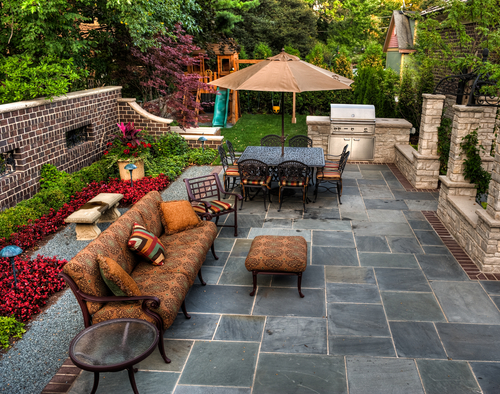Natural Stone Tiles are a very popular floor, countertop and wall option among homeowners today. This popularity has helped contribute to the wide variety of styles and colors we have to choose from. In fact, there are so many choices, selecting the right one for you can be a little overwhelming. In order to help educate you on Natural Stone and help make your selection process a little more productive, here are five things you should know about Natural Stone Tile:
1.) Natural Stone Tiles are susceptible to staining and need to be sealed after installation. The reason for this is the fact that Natural Stone is porous and the sealer covers those pores, making it less susceptible to stains and easier to clean. While there are some sealers that do last for life, for the average sealer, it is recommended that you reseal every 1 to 2 years as part of your maintenance routine. When selecting the right sealer for you stone, you want to make sure you get a high quality sealer. A sealer is protecting your investment and you pretty much “get what you pay for”. It is very important to make sure that your Natural Stone Tiles are clean and free from any debris before sealing. Anything that is on the tile during the sealing process will be locked in and unable to be removed.
2.) Natural Stone Tiles are natural and not man-made. Because of this, you will get variance from tile to tile and no two tiles will look alike. This is important to understand because many times the color shade will be slightly different as well. Some stone types have more variance than others. Because of this variance, it’s always a good idea to purchase a little extra material for your project. This will ensure that you will be able to weed out any tiles that you don’t like, and also you will have matching tile down the road if you are ever in need of a repair. The chance of you finding a matching tile down the road is very rare.
3.) Depending on the type, each Natural Stone Tile has its own recommended uses. For example, granite tiles work great in all areas of the house including the kitchen due to being one of the least porous Natural Stones. More porous stones like Travertine, Marble, and Limestone are not recommend for Kitchen Countertops but work well on floors and in bathroom walls and countertops. These more porous stones are more likely to stain and harbor food bacteria found on kitchen counters. Slate is one of the few natural stone tiles that can hold up through climate and temperature changes and is suitable for outdoor use.
Natural Stone Tiles come in a wide variety of styles and colors and can add beauty to any room in your house. While they do require more maintenance than ceramic or porcelain tile, Natural Stone is very durable and is typically better for resale. Whichever type of stone you decide on for your particular project, consider these 3 items and it will make the selection process a little easier and more fun.



